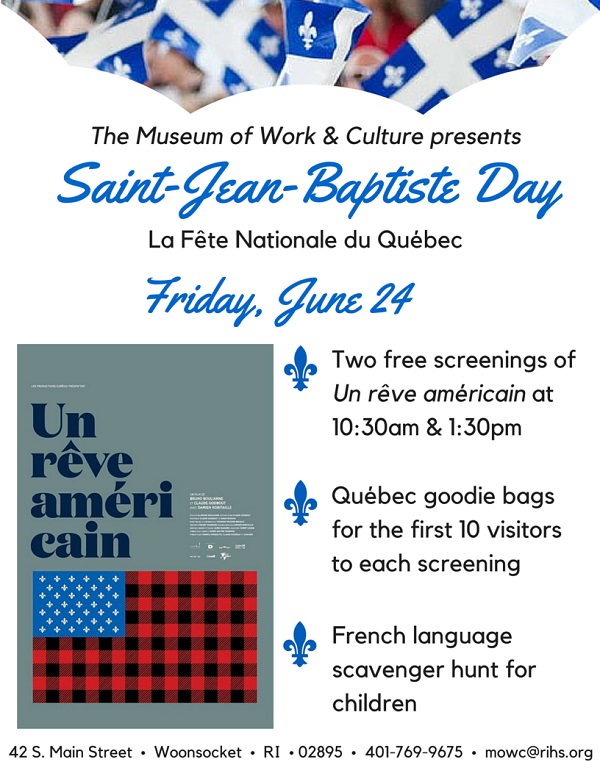Celebration of Saint-Jean-Baptiste Day at the Museum of Work & Culture

Friday, June 24 [FREE]
The Museum of Work & Culture, 42 S. Main St., Woonsocket
Museum of Work & Culture Observes Qu??bec???s National Holiday With Free Film Screenings
(WOONSOCKET, R.I.) ??? The Museum of Work & Culture will be offering free film screenings of Un r??ve americain, on Friday, June 24 in honor of Saint-Jean-Baptiste Day, Qu??bec???s National Holiday.
Un r??ve americain follows musician Damien Robitaille as he journeys across the United States following the trail of the French-Canadian diaspora, and discovering how French language and culture impacted the communities where these immigrants settled.
Screenings will be held at 10:30am and 1:30pm, with the first 10 visitors to each screening receiving Qu??bec goodie bags.
Additionally, a French-language scavenger hunt will be available for children visiting the Museum.
??About the Museum of Work & Culture
The interactive and educational Museum of Work & Culture shares the stories of the men, women, and children who came to find a better life in Rhode Island???s mill towns in the late 19th- and 20th centuries. It was recently named ???Best Overlooked Museum??? in New England by Yankee Magazine.
??About the Rhode Island Historical Society
Founded in 1822, the RIHS is the fourth-oldest historical society in the United States and is Rhode Island???s largest and oldest historical organization, as well as its only Smithsonian Affiliate. In Providence, the RIHS owns and operates the John Brown House Museum, a designated National Historic Landmark, built in 1788; the Aldrich House, built in 1822 and used for administration and public programs; and the Mary Elizabeth Robinson Research Center, where archival, book and image collections are housed. In Woonsocket, the RIHS manages the Museum of Work and Culture, a community museum examining the industrial history of northern Rhode Island and of the workers and settlers, especially French-Canadians, who made it one of the state???s most distinctive areas.
